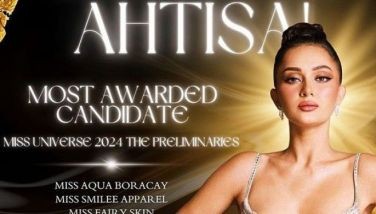The Da Vinci Code

May 25, 2006 | 12:00am
SADBURY, MA., USA – An unstable weather – sunny one minute, raining the next – did not stop people – including myself and my friend Nancy Kodera who lives in this small town where the legendary Babe Ruth once lived‚ from watching the movie "The Da Vince Code" on the world premiere day, May 19. We chose to watch the 11:30 a.m. show after being told that the subsequent showing times had all been booked.
I supposed theaters around the world were filled that day, with people whose curiosity had been stirred up by the sound and fury attending the publicity of the controversial film. In fact, the theaters in the US were filled up, with box-office sales of $77 million, exceeding analysts’ expectations by $10 million.
Most of the viewers at the Framingham Theater – 15 minutes away from Sudbury – were retired citizens, a sector feared by Catholic and Protestant bishops likely to be bothered by the film based on the novel that sold 47 million copies. The film showing had been preceded by a lawsuit filed by two authors charging the The Da Vinci Code author Dan Brown of plagiarism; the court acquitted Brown.
My mother, if she were alive, would have been extremely shocked by the preposterous assumptions made by Dan Brown. First, that Jesus was married and had sired a child by Mary Magdalene who was the true "Holy Grail" – the vessel of Christ’s blood – that all his bloodline has survived, and that evil forces in the Roman Catholic Church would kill to protect those secrets.
Cracking the code that revealed the secrets comes in the form of a cloak-and-dagger film based on Dan Brown’s novel, through the death-defying sleuthing by a symbologist (Tom Hanks) and a cryptologist (Audrey Tautou).
What the Catholic prelates and evangelical ministers worry about is that readers and viewers of the Da Vinci Code might believe that the fictional information of the Code is true.
The possibility of misleading of Christ’s followers led a high-ranking Vatican official urging Catholic communication directors to boycott the film. The official, Archbishop Angelo Amato, said that if: Such lies and errors had been directed at the Koran or the Holocaust, they would have justly provoked a world uprising."
Cardinal Francis Arinze, head of the Vatican’s Congregation for Divine Worship and the Discipline of the Sacraments, hinted at possible legal action against the film because it offends Christ and the church. "Christians must not just sit back and say it is enough for us to forgive and to forget."
The US Conference of Catholic Bishops produced a one-hour television documentary and launched an elaborate website to counter the movie’s sensational historical claims.
Opus Dei, a conservative Catholic organization that is portrayed in the book, and the movie, as a clandestine cabal and the villain in the plot, demanded a disclaimer labeling the film as fiction. Sony Pictures Entertainment, the movie producer, refused.
Brown, a reclusive author, said over a National Public radio during a 2003 publicity tour that the book’s characters and action are fictional but that "the ancient history, the secret documents, the rituals, all of this is factual." He also told CNN that "the background is all true."
And there lies the problem. As a US News and World Report writer says, some of the supposed historical facts contradict central tenets of the Christian faith, such as the divinity of Jesus and the authority and authenticity of Scripture. In fact, one of Brown’s leading characters in the book says, "Almost everything our fathers taught us about Christ is false."
Christian apologists have come out to set the record straight. Since the book’s debut in 2003, dozens of books and internet sites have appeared, aiming to debunk The Da Vinci Code and its perceived assault on Christian doctrine and tradition.
First, on the divinity of Christ. In Brown’s version of history, the early Christians thought of Christ as "a great and powerful man but a man nonetheless" – a mere mortal. It was the Roman Emperor Constantine, according to Brown’s fictional scholars, who imposed the doctrine of Christ’s divinity on the church at the Council of Nicaea in A.D. 325 and the emperor did so largely for political purposes. He wanted to unify the empire around the Christian faith, which he recently had come to embrace.
But as Catholic writers Carl Olson and Sandra Misel point out in their book The Da Vinci Hoax, "any historian, whether Christian or not, knows that the early Christians most definitely believed that Jesus of Nazareth was somehow divine." The central issue at the Council of Nicaea, they note, "was not whether Jesus was merely human or something more but how exactly his divinity . . . was to be understood."
The movie shows the central characters deciphering Da Vinci’s portraiture of the Last Supper, pointing out that the disciple seated beside Jesus is actually Mary Magdalene.
On evangelicals, Pastor Baugh of a Southern California mega church said that Dan Brown did the church a favor. "He forced people who call themselves followers of Christ to investigate what that really means."
Other evangelical leaders have "attempted to seize" on Brown’s success as an opportunity to reinforce the faith of believers and to win new souls.
Robert Johnson, a professor of theology and culture at Fuller Theological seminary, said, "The only question is whether the church will be part of the conversation."
TO BE SURE, evangelical leaders have been critical of The Da Vinci Code. "This has all the evidence of something cooked up in the fires of hell," said evangelical radio broadcaster James Dobson on Focus on the Family.
IT’S BECAUSE the book and film pose such a threat, many evangelicals say, that warrants a strong response. "Were making the best of a situation that is going to do a lot of damage," said Erwin Lutzer of Chicago’s Moody Church and author of The Da Vinci Deception.
It’s a remarkable turnabout from the outcry that greeted Martin Scorsese’s The Last Temptation of Christ, in 1988, when Campus Crusade for Christ called for a boycott. Rather than boycott the Da Vinci Code, Campus Crusade has retained popular evangelical speaker Josh McDowell, author of The Da Vinci Code: A Quest for Answers.
To challenge Brown’s assertions, "I don’t recommend people go to the movie, but 90 percent of them will," said McDowell. "The guy is a phenomenal writer, and I can’t take that away from him."
Christian Broadcasting Network’s Gordon Robertson said, "The real history of Christianity . . . is far more complex" than in the Da Vinci Code. ((It’s) filled with enough flesh and blood to make it a better story than the one Dan Brown invented."
Like many viewers of the movie, I was challenged by the controversial claims set forth by Dan Brown. But rather than allow myself to question the veracity of Dan Brown’s claims, I thought more of his versatility at research and composition. Did Jesus and Mary marry? I don’t know, but whether that was true or not, it does not detract from my faith in Jesus’ divinity...
My e-mail is [email protected]
I supposed theaters around the world were filled that day, with people whose curiosity had been stirred up by the sound and fury attending the publicity of the controversial film. In fact, the theaters in the US were filled up, with box-office sales of $77 million, exceeding analysts’ expectations by $10 million.
Most of the viewers at the Framingham Theater – 15 minutes away from Sudbury – were retired citizens, a sector feared by Catholic and Protestant bishops likely to be bothered by the film based on the novel that sold 47 million copies. The film showing had been preceded by a lawsuit filed by two authors charging the The Da Vinci Code author Dan Brown of plagiarism; the court acquitted Brown.
My mother, if she were alive, would have been extremely shocked by the preposterous assumptions made by Dan Brown. First, that Jesus was married and had sired a child by Mary Magdalene who was the true "Holy Grail" – the vessel of Christ’s blood – that all his bloodline has survived, and that evil forces in the Roman Catholic Church would kill to protect those secrets.
Cracking the code that revealed the secrets comes in the form of a cloak-and-dagger film based on Dan Brown’s novel, through the death-defying sleuthing by a symbologist (Tom Hanks) and a cryptologist (Audrey Tautou).
What the Catholic prelates and evangelical ministers worry about is that readers and viewers of the Da Vinci Code might believe that the fictional information of the Code is true.
The possibility of misleading of Christ’s followers led a high-ranking Vatican official urging Catholic communication directors to boycott the film. The official, Archbishop Angelo Amato, said that if: Such lies and errors had been directed at the Koran or the Holocaust, they would have justly provoked a world uprising."
Cardinal Francis Arinze, head of the Vatican’s Congregation for Divine Worship and the Discipline of the Sacraments, hinted at possible legal action against the film because it offends Christ and the church. "Christians must not just sit back and say it is enough for us to forgive and to forget."
The US Conference of Catholic Bishops produced a one-hour television documentary and launched an elaborate website to counter the movie’s sensational historical claims.
Opus Dei, a conservative Catholic organization that is portrayed in the book, and the movie, as a clandestine cabal and the villain in the plot, demanded a disclaimer labeling the film as fiction. Sony Pictures Entertainment, the movie producer, refused.
Brown, a reclusive author, said over a National Public radio during a 2003 publicity tour that the book’s characters and action are fictional but that "the ancient history, the secret documents, the rituals, all of this is factual." He also told CNN that "the background is all true."
And there lies the problem. As a US News and World Report writer says, some of the supposed historical facts contradict central tenets of the Christian faith, such as the divinity of Jesus and the authority and authenticity of Scripture. In fact, one of Brown’s leading characters in the book says, "Almost everything our fathers taught us about Christ is false."
Christian apologists have come out to set the record straight. Since the book’s debut in 2003, dozens of books and internet sites have appeared, aiming to debunk The Da Vinci Code and its perceived assault on Christian doctrine and tradition.
First, on the divinity of Christ. In Brown’s version of history, the early Christians thought of Christ as "a great and powerful man but a man nonetheless" – a mere mortal. It was the Roman Emperor Constantine, according to Brown’s fictional scholars, who imposed the doctrine of Christ’s divinity on the church at the Council of Nicaea in A.D. 325 and the emperor did so largely for political purposes. He wanted to unify the empire around the Christian faith, which he recently had come to embrace.
But as Catholic writers Carl Olson and Sandra Misel point out in their book The Da Vinci Hoax, "any historian, whether Christian or not, knows that the early Christians most definitely believed that Jesus of Nazareth was somehow divine." The central issue at the Council of Nicaea, they note, "was not whether Jesus was merely human or something more but how exactly his divinity . . . was to be understood."
The movie shows the central characters deciphering Da Vinci’s portraiture of the Last Supper, pointing out that the disciple seated beside Jesus is actually Mary Magdalene.
On evangelicals, Pastor Baugh of a Southern California mega church said that Dan Brown did the church a favor. "He forced people who call themselves followers of Christ to investigate what that really means."
Other evangelical leaders have "attempted to seize" on Brown’s success as an opportunity to reinforce the faith of believers and to win new souls.
Robert Johnson, a professor of theology and culture at Fuller Theological seminary, said, "The only question is whether the church will be part of the conversation."
TO BE SURE, evangelical leaders have been critical of The Da Vinci Code. "This has all the evidence of something cooked up in the fires of hell," said evangelical radio broadcaster James Dobson on Focus on the Family.
IT’S BECAUSE the book and film pose such a threat, many evangelicals say, that warrants a strong response. "Were making the best of a situation that is going to do a lot of damage," said Erwin Lutzer of Chicago’s Moody Church and author of The Da Vinci Deception.
It’s a remarkable turnabout from the outcry that greeted Martin Scorsese’s The Last Temptation of Christ, in 1988, when Campus Crusade for Christ called for a boycott. Rather than boycott the Da Vinci Code, Campus Crusade has retained popular evangelical speaker Josh McDowell, author of The Da Vinci Code: A Quest for Answers.
To challenge Brown’s assertions, "I don’t recommend people go to the movie, but 90 percent of them will," said McDowell. "The guy is a phenomenal writer, and I can’t take that away from him."
Christian Broadcasting Network’s Gordon Robertson said, "The real history of Christianity . . . is far more complex" than in the Da Vinci Code. ((It’s) filled with enough flesh and blood to make it a better story than the one Dan Brown invented."
Like many viewers of the movie, I was challenged by the controversial claims set forth by Dan Brown. But rather than allow myself to question the veracity of Dan Brown’s claims, I thought more of his versatility at research and composition. Did Jesus and Mary marry? I don’t know, but whether that was true or not, it does not detract from my faith in Jesus’ divinity...
BrandSpace Articles
<
>
- Latest
- Trending
Trending
Latest
Latest
Recommended

May 20, 2024 - 4:01pm



























